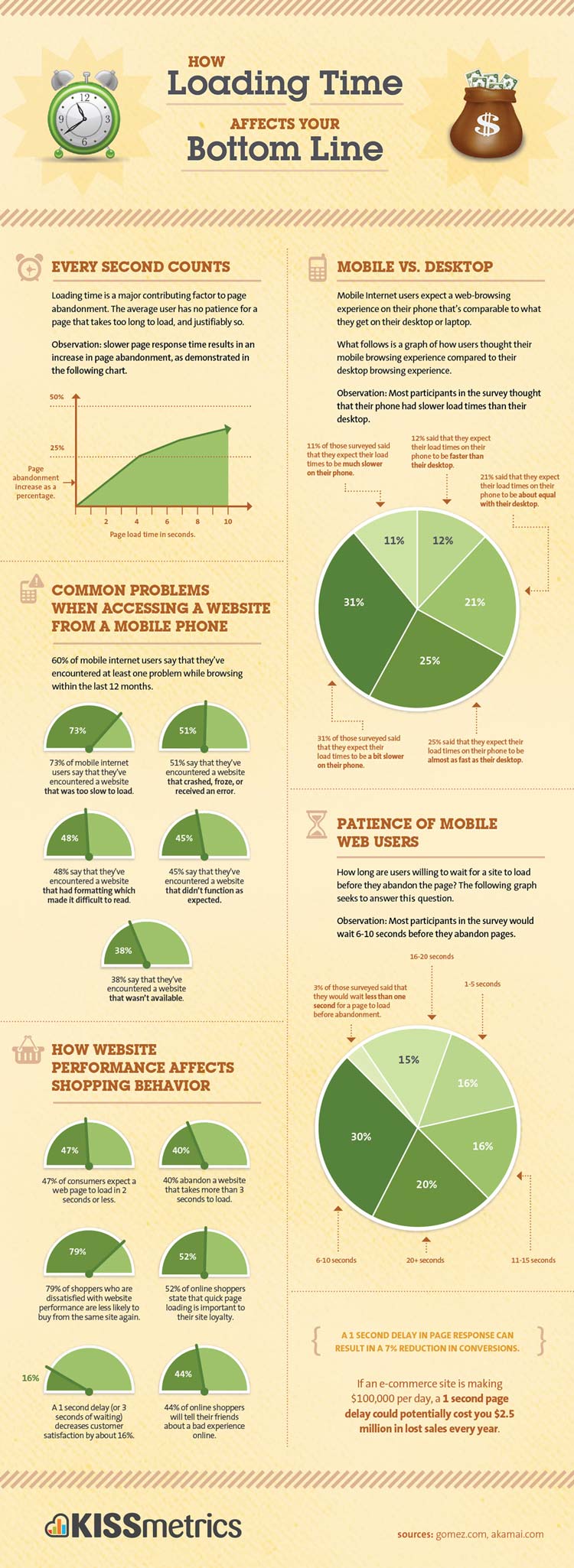Three Important Factors That Affect Both SEO & Site Visitors
- Page Speed / Load Times
- Navigation / Linking
- Content / Transition Queues
An Important Side Note Before Continuing: certain metrics like Google Analytics report "time spent" on your site and "pages visited" during a session, which in turn makes you think of lower numbers in those categories as being poor results. However, from the user perspective, the goal is actually to spend the least amount of time and visit as few pages as possible and still reach the goal/conversion for which they visited.
Page Speeds
Let's face it: in this day and age, people are generally impatient. Impatient comes with a strong connotation though; in reality, a better word would be spoiled.
When we say spoiled we are referring to the rapid pace in technological advancement which pushes the limits of both size and speed in everything we create.
To put it in perspective - 1 in 8 users will abandon a web page if it takes longer than 2 seconds to load; and 1 in 4, if it takes over 4 seconds.
When every other electronic device you use is lightning fast, you don't open your browser expecting a website to take 8-10 seconds to load - but it happens anyway.
There are many factors involved in PageSpeed scoring, and it's even possible to have good "scores", but still have slow load times.
For example, if there are an excessive amount of requests and/or if you have so many images or such large images, that even compressing them optimally doesn't reduce the overall page size enough to bring down the actual loading speed.
Page speed optimization does affect your overall site ranking to a degree, but it's safe to say that it affects your actual traffic and bounce rates more than anything.
Navigation Issues
The ability of a visitor or a robot to "crawl", or rather - navigate, your site is another factor that affects both the user and your site ranking.
If robots have trouble reaching your deepest pages, or finding the entirety of your content then you simply aren't going to rank as well as you could if that content was reachable.
The same goes for your website visitors though: if they are unable to find what they are looking for because your navigation is too skewed then the odds are that they will abandon your site.
A good rule of thumb is that any page or content can be reached within 2-3 clicks from any other page. If necessary, you can write a certain page's copy such that there are links provided in the context that lead to relevant pages which are otherwise 4+ clicks away without linking to them in the actual content.
Content Transition Queues
Another thing to consider is what we like to refer to as transition queues. If there is more to learn on a topic in the content below a certain point, but there is also a related goal/conversion elsewhere that a person should be aware of, then it's always smart to write in a transition queue.
These queues come in the form of actual copy and let the user know that reading further will provide more information, otherwise they can navigate away from the page at that time to find what they are ultimately trying to locate.
For example: "if you want to learn more about this product, keep reading, otherwise head to our online shop now to make your purchase."
Again, this comes back to impatience. People visiting your site want to spend as little time as possible getting all the information they need and reaching their goal, but without missing anything important or relevant along the way.
As we all know, page content and keywording definitely plays a big role in SEO; however, it also seriously affects the process of users making a conversion, and especially so if your content is hard to read or provides no help transitioning towards the goal.
The Bottom Line
SEO will help more, and more relevant, users find your website - but some aspects of SEO affect the user equally as much as they do your ranking.
There isn't much use in being found though, if those who find you end up leaving without reaching their goal - even if it's just more information on a topic.
And on that note, we leave you with this great infographic by KissMetrics on load times and the effects on user engagement and abandonment.

